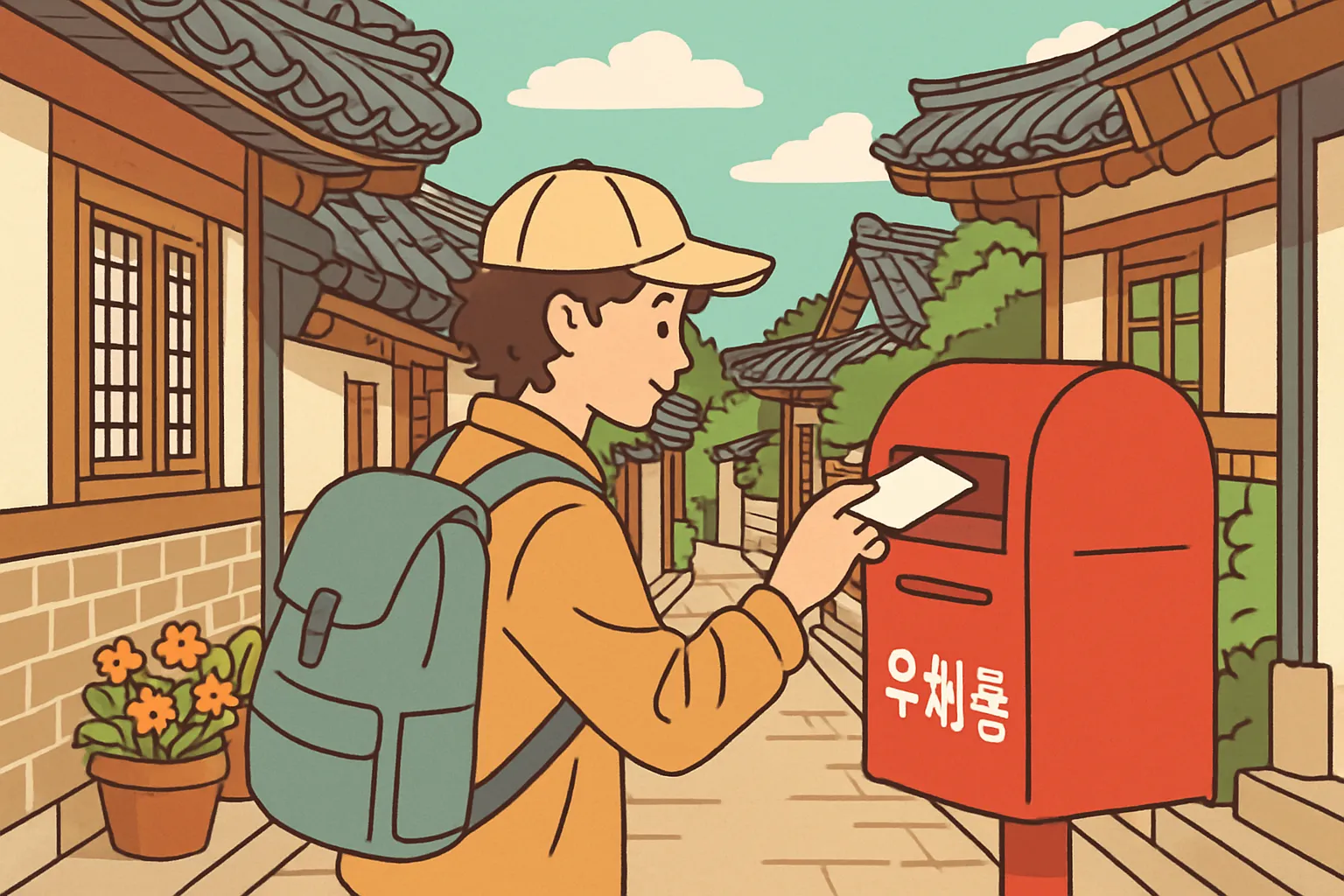Oops, I Missed My Stop! Your Korean Survival Guide
Hello! This is [Maeil Hangul], here to upgrade your Korean skills!
Ever been so absorbed in your phone on a bus or subway that you suddenly look up and realize… you’ve gone way past your destination? Don’t panic! It happens to everyone. Today, we’re going to learn the essential Korean phrases you need for this exact situation. Nowadays in Korea, with so many amazing webtoons to read and K-pop videos to watch on the go, it’s easier than ever to get distracted. These phrases will turn your moment of panic into a calm and confident conversation!
Core Expressions You Need to Know
Here are your lifesaver phrases for when you’ve missed your stop.
- 저기요 (Jeogiyo)
- Pronunciation: [Juh-gee-yo]
- English Meaning: “Excuse me.” / “Over here.”
- Detailed Explanation: This is the magic word to politely get someone’s attention in Korea. It’s perfect for talking to a stranger, a waiter, or in our case, the bus driver (기사님 – gisanim). It’s much more natural than saying “excuse me” to get attention. You can say it with a slightly rising intonation.
- 정류장을 지나쳤어요 (Jeongnyujang-eul jinachyeosseoyo)
- Pronunciation: [Jeong-nyu-jang-eul jee-na-chyuh-ssuh-yo]
- English Meaning: “I missed the (bus) stop.”
- Detailed Explanation: This is the key phrase to explain your problem.
- 정류장 (jeongnyujang): bus stop
- -을 (eul): object marker
- 지나쳤어요 (jinachyeosseoyo): past tense of 지나치다 (jinachida), which means “to pass by” or “to go too far.”
You can use this for subway stations too by saying 역을 지나쳤어요 (Yeok-eul jinachyeosseoyo).
- 내려야 하는데요 (Naeryeoya haneundeyo)
- Pronunciation: [Nae-ryuh-ya ha-neun-de-yo]
- English Meaning: “I need to get off, but…” / “I was supposed to get off…”
- Detailed Explanation: This is a soft and polite way to explain your situation. The -는데요 (-neundeyo) ending is very common in Korean conversation. It adds a bit of background information and makes your sentence sound less direct and more natural. It implies, “…so I have a problem.”
- 다음 정류장에서 세워주세요 (Daeum jeongnyujang-eseo sewojuseyo)
- Pronunciation: [Da-eum jeong-nyu-jang-eh-suh seh-wo-ju-seh-yo]
- English Meaning: “Please let me off at the next stop.”
- Detailed Explanation: This is your solution! It’s a clear and polite request.
- 다음 (daeum): next
- 정류장에서 (jeongnyujang-eseo): at the bus stop
- 세워주세요 (sewojuseyo): “please stop for me.” This comes from 세우다 (seuda – to stop something) + the polite request form -아/어 주세요 (-a/eo juseyo).
Example Dialogue in Action
Imagine you were so busy watching the latest episode of the K-drama “Lovely Runner” (선재 업고 튀어) that you missed your stop. Here’s how you could talk to the bus driver.
- A (You): (Walking to the front of the bus) 저기요, 기사님…
(Jeogiyo, gisanim…)
“Excuse me, driver…” -
B (Bus Driver): 네, 무슨 일이세요?
(Ne, museun ir-iseyo?)
“Yes, what can I help you with?” -
A (You): 죄송한데, 제가 정류장을 지나쳤어요. 홍대입구에서 내려야 하는데요…
(Joesonghande, jega jeongnyujang-eul jinachyeosseoyo. Hongdae-ipgu-eseo naeryeoya haneundeyo…)
“I’m sorry, but I missed my stop. I was supposed to get off at Hongik University Station…” -
B (Bus Driver): 아, 괜찮아요. 다음 정류장에서 세워줄게요.
(A, gwaenchanayo. Daeum jeongnyujang-eseo sewojulgeyo.)
“Ah, that’s okay. I’ll let you off at the next stop.” -
A (You): 정말 감사합니다!
(Jeongmal gamsahamnida!)
“Thank you so much!”
Culture Tip & Trend Deep Dive
Your Smartphone is Your Best Friend (and Enemy!):
Just like in our example, getting lost in your phone is a major reason people miss their stops in Seoul. But you can also use it to save you! Most Koreans use map apps like Naver Maps or Kakao Maps. These apps have a brilliant feature: you can set your destination, and they will give you a phone notification or vibration right before you need to get off. It’s a total lifesaver and will make you feel like a local!
“기사님 (Gisanim)” – The Magic Word for Bus Drivers:
When you talk to a bus driver, always call them 기사님 (gisanim). The “-님 (-nim)” suffix is an honorific that shows respect. Using this word immediately makes you sound more polite and fluent.
Let’s Wrap It Up & Practice!
Great work today! You’ve learned how to handle a common travel problem with four simple but powerful Korean phrases. Now you can confidently navigate Korean public transportation, even if you get a little distracted.
Quick Practice Quiz:
- You need to get the driver’s attention and explain that you missed your stop. Fill in the blank:
저기요, 제가 ___________ ____________.
- How do you politely ask the driver to stop the bus for you at the next stop? (Try to write the whole sentence!)
Ready to test your new skills? Leave a comment below with your answers or try making your own sentence using today’s expressions. We’d love to see what you come up with






